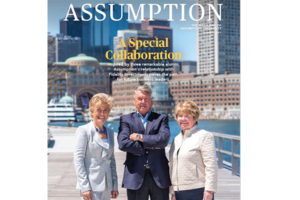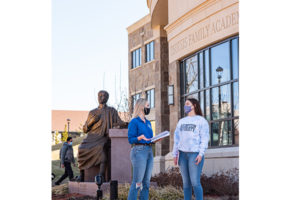True to its character and mission, members of the Assumption community mobilized to aid their greater communities when the COVID-19 pandemic hit this spring. In Worcester, Assumption supported the city by offering up its residence halls for medical workers and donating PPE, while Assumption’s Sodexo staff supported the UMass Memorial Medical Center dining services team to provide three meals a day for first responders, medical staff, patients, and security at the city’s field hospital.
Across the country, alumni, students, and faculty all answered the call to respond in their own unique ways. These are a few of the many stories of community amid a deadly pandemic.
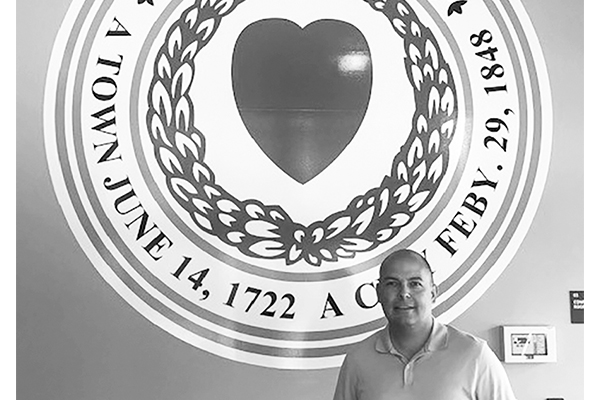
Paul Belsito ’00, G’13
Coordinating Worcester’s COVID-19 response
For Paul Belsito ’00, G’13, one of the most impactful chapters in his esteemed philanthropic career was realized during the height of the COVID-19 pandemic. This spring, Belsito spent seven weeks assisting the City of Worcester in its immediate response efforts, supporting the development of the strategy, operations, and execution of the Emergency Operations Center.
The main goal of our effort was to reduce the spread of COVID-19 to the most vulnerable in our community to reduce the pressure on the local hospital network, and to ensure first responders had the proper equipment needed to protect themselves as well as the community,” Belsito explained, adding that they also collected data that enabled city leaders to properly and accurately deliver virus-related information to the community.
Belsito said that one of the more visible responsibilities was to create a number of homeless shelters throughout the city and help transform the DCU Center into a field hospital. “This was a collaborative effort and happened within days,” he said. “It truly showed me how effective a partnership can be – with city government, community leaders, and hospital leaders rolling up their sleeves to get this done.”
Belsito, a business major who earned his MBA from Assumption, believes that when a community comes together, it can do great things. “I have never seen public service like I have during this time,” he explained. “The dedicated team of public health officials, city leaders, and emergency response officials is something I will remember for my entire career.”
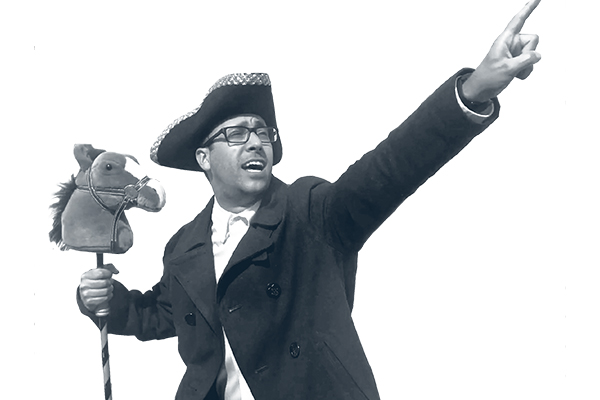
Alex Ohannesian ’06
Using creativity to enhance the virtual classroom
Alex Ohannesian ’06, a third-grade teacher at Woodland Elementary School in Milford, has always been creative in the way he teaches. But when the pandemic forced schools to move to remote learning, he had to think outside the classroom box.
“The pandemic made all teachers rethink everything,” said Ohannesian, adding that teaching in person is a lot different than teaching kids on a computer.
“We had to make sure we were teaching to the same standards but trying to find online resources that were able to help us do that,” he explained, adding that assignments had to be things that students could do independently but that also challenged them. Ohannesian, who was a history and elementary education major, said the priority was to come up with interactive and new ways to teach students, reimagining assignments in ways that were fresh and new.
And Ohannesian did just that. He created interactive online worksheets, and when it came to teaching fractions on a number line, which Ohannesian said can be hard for students to grasp in a classroom, let alone online, he created a Google Slide presentation that resembled the Pac-Man arcade game, accompanied by music. He also continued the tradition of the annual Ohannesian Idol, a project he instituted to help students creatively show what they have learned. Per usual, Ohannesian went first, posting a YouTube video of himself dressed as Paul Revere riding a hobby horse to his original song called “North Church Lights,” a spin on The Weeknd’s “Blinding Lights.”
“We had a great response from the students,” he said. Several students and a few of his fellow teachers participated in the project, which was optional this year due to the pandemic. “It was great to see them take that initiative on their own and do it.”
Though the spring was filled with ups and downs, Ohannesian said there were far more successes than difficulties. “In the end it made us all better teachers because we were all exposed to new things,” he said.
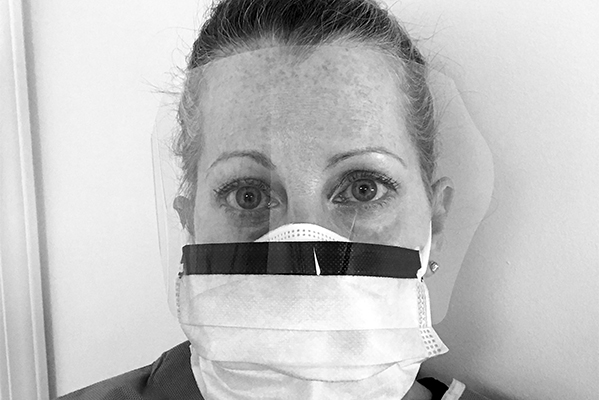
Diane Alagno Levis ’00
On the front lines in New Orleans
When the COVID-19 pandemic impacted New Orleans this spring, the area had some of the highest numbers of cases in the country. As a result, Diane Alagno Levis ’00 was one of the many medical professionals who were called to treat patients during the surge.
Levis, a physician assistant at a New Orleans-area medical facility practicing integrative medicine, suddenly went from performing elective care and preventive wellness therapy to treating extremely ill and at times unstable patients.
“It was a huge shift of culture from wellness care to treating very ill patients in an ambulatory setting,” Levis said, adding her patients were severely ill with high fever, severe fatigue, nausea, vomiting, diarrhea, severe dehydration, cough, and severe shortness of breath. “We provided supplemental oxygen therapy, nebulizer treatments, IV fluids, IV medications, and IV vitamins to treat the symptoms of COVID-19. The hospitals and emergency rooms were full, and our focus was supportive care, to keep as many patients out of the ERs as possible,” she said.
Like most hospitals across the country, staffing issues forced Levis to work many hours in full personal protective equipment (PPE), which took weeks to acquire. In fact, when fellow
alumna Allison Coutts ’00 learned that Levis was experiencing difficulty procuring head coverings, she made and sent her one. “It was very disconcerting working in this setting without proper PPE,” she said.
Levis, a biology major at Assumption, constantly feared she would bring the virus home to her husband, Jeff ’00, and two sons. Before leaving work, she began a routine of washing her hands, arms, and face with a hospital-grade disinfectant wipe (a very painful process due to cuts on her face and nose from her mask), changing clothes, and wiping down her shoes. Her garage became her decontamination zone, where she immediately laundered her clothes and showered before coming in contact with her family.
“During the surge, we were overwhelmed with more patients than we could manage; however, we never turned anyone away,” said Levis. “The love and support I received from family and friends, including weekly Zoom meetings with my Assumption girls, made such a strong impact. It is incredibly challenging spending eight- plus hours per day in an N95 mask, and knowing the community was behind me helped tremendously with the mental stress of being on the front lines of this pandemic.”
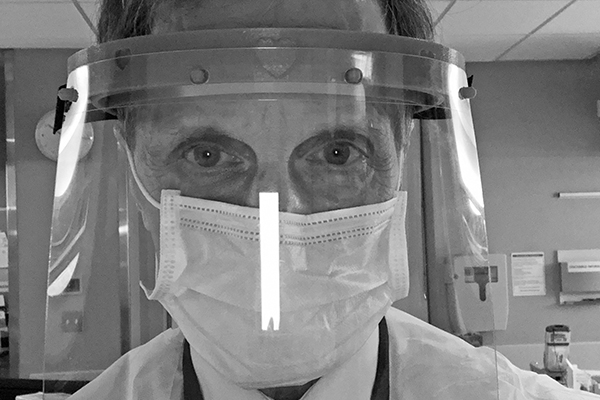
Thomas Walsh, M.D. ’74, HD’11
Infectious diseases physician on the front line in NYC
In the first week of March, when COVID-19 cases inundated the Greater New York City Metropolitan Area, Thomas Walsh, M.D. ’7 HD’11 discovered that his duties as a physician at the Weill Cornell Medicine Division of Infectious Diseases took on a greater meaning – one that he has spent his career preparing for.
Dr. Walsh, who was a biology major with a chemistry minor, has spent the past 30 years working in the field of infectious diseases, meeting the challenges of new and emerging pathogens with a combination of laboratory and clinical science, to bring new treatments and advances in patient care. When COVID-19 emerged, he and his colleagues were well poised to attack this disease from a multidisciplinary standpoint.
“My clinical efforts became exclusively dedicated to the care of these critically ill patients, as well as helping to implement several clinical research protocols, which would provide them with new therapeutic
agents,” said Dr. Walsh, adding that the hospital’s nearly 1,000 beds were almost all occupied by COVID-19 patients, as were the beds in the intensive care units, where he worked from morning until night caring for extremely ill patients.
Dr. Walsh, along with his associate director, their Clinical Research Unit within the Transplantation Oncology Infectious Diseases program, and their division colleagues, “undertook an unprecedented effort in opening four major clinical protocols in order that our patients would have access to the most promising therapeutic advances in the treatment of this frequently lethal infection,” he explained. Dr. Walsh served as an investigator in three interventional protocols and served on the Weill Cornell Clinical Research Task Force, which reviewed potential clinical protocols that were offered for the care of patients with COVID-19.
Dr. Walsh explained that his division contributed significantly to the study of remdesivir, used to improve the outcome of patients with moderate to severe COVID-19, while their study of selinexor has strong pre-clinical foundation and preliminary clinical data. They also contributed to investigating one of the lead anti-SARS CoV2 vaccines being developed for clinical trials.
“Beyond our dedication to the best science, our compassion at the patient’s bedside is always paramount in clinical care,” he said, something Assumption provided him. “The liberal arts foundation of an Assumption education provides lifelong guidance in understanding the vitally interactive roles of the sciences and humanities in medicine.”

Kyla Trail ’23
Caught COVID-19 working as a CNA
When Kyla Trail ’23 lost her waitressing job due to the pandemic, she decided to return to work as a Certified Nursing Assistant {CNA), a job she held before enrolling in Assumption’s nursing program. Though she knew working at a nursing home during a pandemic was dangerous, her Assumption education influenced her decision to help her community because it was “the right thing to do,” she said.
“Assumption has a strong community based on helping others, and the nursing program has really led me to do the best I can to better the lives of those who need it most,” said the Milford native. “When the pandemic hit, it became more important than ever to spend time with the residents and really give them the personalized attention they needed. Working with many dementia patients, it was a very confusing time for many residents.”
Because of her proximity to the residents and just a cloth mask to protect her, Trail contracted COVID-19 in late April.
Since all COVID-19 positive patients were isolated on a single floor, the limited amount of PPE – masks, gowns, and face shields – was reserved for those nurses and CNAs. “Nurses like me were only issued a surgical mask that was to be worn all week and would receive a new one at the start of every week, and residents were not required to wear masks,” explained Trail, adding that residents were protected by not having visitors, eating meals in their rooms, and no group activities. Despite isolating the residents and separating those who tested positive, Trail was exposed when two of her assigned residents became infected.
“Nursing facilities were not prepared to deal with the virus and still aren’t,” said Trail. “Many residents were lost due to COVID-19, and every single resident there ended up having it. I think there needs to be a lot more focus on how to better protect both the residents and nurses to slow the spread.”
Trail’s symptoms included exhaustion and loss of the senses of smell and taste, and she quarantined for three weeks while she recovered. Despite contracting COVID-19 and the risks of her profession, Trail still plans on becoming a nurse. “I am really passionate about helping others and have always found a lot of pride in being able to take care of those in need and giving back to the community,” she said. “I think that this pandemic just proves even more that having co reliable healthcare providers is so important.”
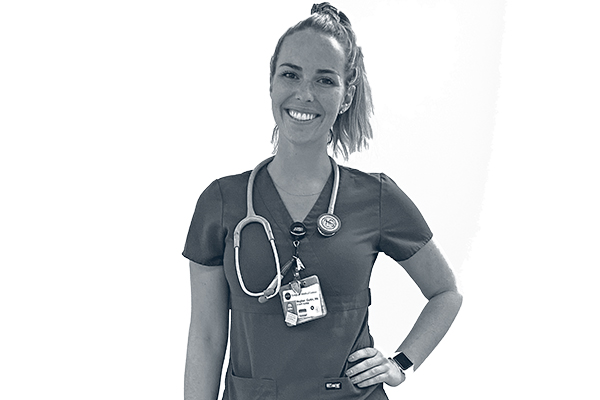
Meghan Curtin ’16
NYC nurse on the front lines of COVID-19
When Meghan Curtin ’16 began her nursing career, she never thought her time as a member of the Assumption Women’s Lacrosse team would be one of her greatest assets.
“I’m on a staff of 10 nurses and it’s just like being on the field with 10 teammates,” said Curtin, who was a biology major. “Especially during a global pandemic, you rely on the support of your colleagues, just as you would your teammates on the field.”
A senior staff nurse at NYU Langone Health in New York City, Curtin’s oncology medicine floor was the first to be transformed into a “COVID-19” floor when the pandemic hit in March. “No one knew the extent of how much this was going to hit and how it was going to spread so quickly and how sick the patients would be,” she said. “My floor is not an intensive care unit setting, but within a week it was filled with all COVID-19 patients, and within two weeks it became a COVID-19 ICU.”
In the early days of the pandemic, New York City was hit hardest. Because Curtin and her colleagues weren’t trained to work with patients on ventilators, travel nurses were brought in and Curtin was trained to become an ICU nurse at an accelerated rate. “Within a couple of weeks, there were no oncology patients in the hospital,” she said. “We had eight COVID-19 ICUs. It was basically a COVID-19 hospital.”
In April, The New York Times published a feature story on the emotional toll of the pandemic on Curtin’s ICU team. For Curtin, the uncertainty of not knowing what she would face each day and working in an entirely new setting for which she was not trained was sometimes frightening. “The patients were extremely scared, and you could see it in their eyes,” she said, adding that family wasn’t allowed, and she and the doctors often didn’t know the answers to their questions. At one point, Curtin’s job was to facilitate farewell messages between patients and their families via iPad. “There was an emotional turmoil to it. That role in itself was emotionally hard, just trying to understand this virus and how a hospital like NYU and such great healthcare couldn’t figure out a way to control or treat this virus.”
Curtin, who didn’t see her immunocompromised father for five months, said she believes the more we learn about the virus, the better prepared we’ll be for the next spike. “I think I’ll remember this forever, and so will everyone,” she said. “To experience the way a pandemic can shape every- one’s lives, I think that post-coronavirus there is going to be a new way of life.”
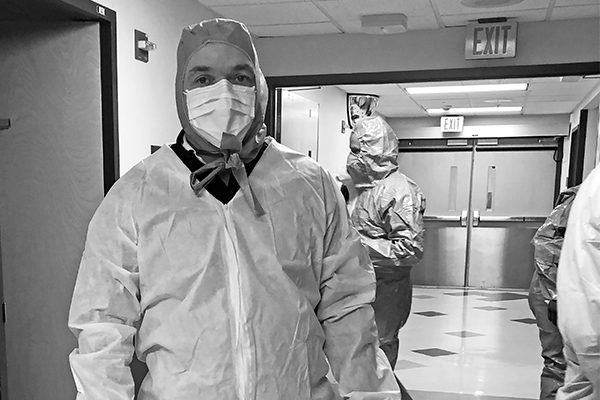
Terrence Sheehan, M.D. ’86, P’23
Infusing ethics into a COVID-19 response
Terrence Sheehan, M.D. ’86 has never been more thankful for his liberal arts education than when the pandemic hit. Dr. Sheehan, who works as a chief medical officer {CMO) in the Adventist HealthCare system based in Rockville, MD, was enlisted as deputy system CMO in organizing the healthcare system’s response to the COVID-19 crisis.
“In additional to my regular duties and clinical activities, my days were filled with Zoom meetings,” said Dr. Sheehan, who saw patients in the morning and spent afternoons in administrative meetings, working with incident command and tracking and responding daily to “the surge”; physically redesigning nursing units to isolate patients and protect healthcare workers; and serving as a member of the ethics committee, developing approaches to shortages of personal protective equipment and ventilators.
“My liberal arts education was put to the test,” said Dr. Sheehan, who was a chemistry major at Assumption. “My ability to think broadly was a significant contributor to the questions raised, particularly on the ethics committee. We had to address questions such as: If we run out of ventilators, what do we do? Who is prioritized in a pandemic surge: healthcare workers’ lives or patients’ lives? I was engaged, participated, and felt I needed to be there.”
Dr. Sheehan said each day was consumed by the need to respond to this new reality and develop detailed operational maps for the entire four-hospital system of healthcare workers to use. Situations included what to do when someone entered the emergency room, when a healthcare worker was exposed, and when the hospital ran out of supplies. In addition, he was tasked with setting up the region’s only acute inpatient rehabilitation unit for those debilitated from COVID-19 after extended stays in intensive care units.
In addition, the State of Maryland set up three alternative care sites to provide specialized care for COVID-19 patients. Dr. Sheehan was appointed CMO of the Takoma Park hospital, taking the clinical lead to set up the specialty hospital, and is responsible for overseeing daily medical care for those served.
“My mantra during this time has remained the same,” he said. “That is to take care of the patients, keep the healthcare workers safe, and be good stewards of personal protective equipment.”
ASSUMPTION’S PANDEMIC RESPONSE
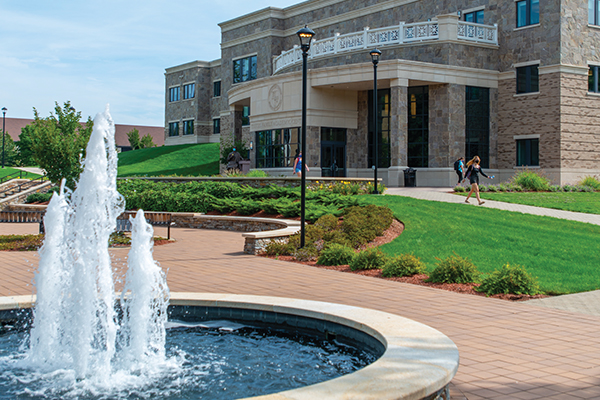 In March, in the midst of a global pandemic, Assumption was faced with making an unprecedented decision, and doing so quickly. Throughout the last several months, the University community–the dedicated faculty and staff and the resilience of the students–helped Assumption successfully manage an unusual and unprecedented time.
In March, in the midst of a global pandemic, Assumption was faced with making an unprecedented decision, and doing so quickly. Throughout the last several months, the University community–the dedicated faculty and staff and the resilience of the students–helped Assumption successfully manage an unusual and unprecedented time.
Early Response
This spring, the novel coronavirus, COVID-19, disrupted the lives of millions, including thousands of colleges and universities across the globe. After closely monitoring the rapidly spreading virus and considering the safety of the community, Assumption decided in early March to suspend operations at both its campuses in Worcester and Rome, Italy, and shift to remote learning for the remainder of the spring semester.
“Every decision we made was always motivated by the health and safety of our students, faculty, and staff and our community beyond the campus,” said Francesco C. Cesareo, Ph.D., president of Assumption University. “We also have a responsibility to the community in which we are living, working, and studying. We don’t want to put them at risk any more than we want to put our own students, faculty, and staff at risk.”
As homes quickly became classrooms, offices, and make- shift daycares and schools as students, faculty, and staff transitioned to a remote workplace, the University began considering the fall semester, spending the next several months carefully planning the return of students to campus.
Home from Rome
Although it took many colleges and universities in the U.S. until early March to turn their attention to COVID-19 and the challenges it would bring to the spring semester, Assumption had already begun planning for a disruption and ways to protect its students beginning in early February. Its Rome, Italy campus is located about 300 miles from the heart of Italy’s coronavirus outbreak in the northern regions such as Lombardy.
As the numbers in Northern Italy began to rise rapidly, members of the Assumption administration watched closely how Italian and American institutions responded, followed U.S. State Department advisories, and consulted their medical doctor in Rome. The University took precautions, banning travel throughout Italy and Europe for students studying abroad, and encouraged students and employees not to travel over spring break, though it soon became clear that the rapidly growing numbers would force Italy to eventually lock down.
“We did not want to be in a position where the students would not be able to get back and what that would mean in terms of our ability to take care of them and to ensure their safety,” said President Cesareo. “As that picture became clearer, the decision was made that they needed to come home.”
The timing of that decision couldn’t have come at a better moment; according to President Cesareo, only a week after the students returned, Italy shut down its borders.
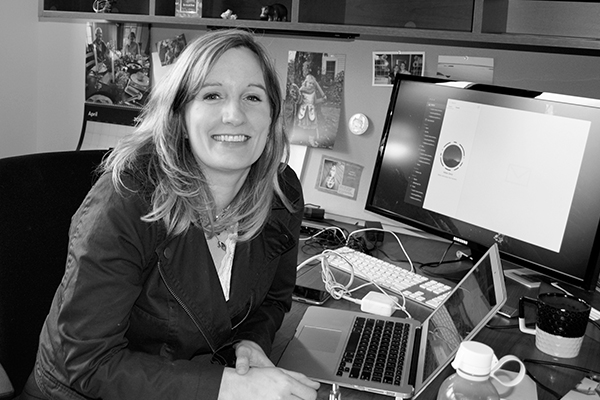 Leveraging Technology
Leveraging Technology
In the switch to remote learning, faculty took a variety of approaches in order to deliver to students the high-quality Assumption education for which the institution is renowned.
“We had about two weeks to get faculty trained in online learning and the learning management system and move all courses online,” said Beth Peterson, instructional technology specialist in Assumption’s Informational Technology Department.
This meant adding more integrated tools to the content management system Brightspace and providing software licenses for faculty so that they could hold synchronous classes, office hours, and advising meetings with their students.
The D’Amour Center for Teaching Excellence (DCTE) also mobilized to support faculty. Professor of English and Director of the DCTE James Lang,
Ph.D., and Associate Professor of Psychology and Associate Director for Grants and Research for the DCTE Sarah Rose Cavanagh, Ph.D., hosted a Zoom event for faculty focused on thinking about final exams and projects in light of the shift online. There they emphasized the importance of ensuring that students were emotionally supported and felt connected to the community. Prof. Cavanagh was also part of a team of experts from across the nation who helped produce a collection of open-source resources that provides guidance to faculty on developing emergency remote instruction.
According to Dean of the D’Amour College of Liberal Arts and Sciences Paula Fitzpatrick, Ph.D., faculty were instructed to notify Assumption’s Student Success CARE team if students were experiencing difficulty; the Academic Support Center quickly trained peer tutors to offer online tutoring, and the Student Accessibility Office prepared a set of guidelines for faculty to ensure accessibility for all students. Assumption also allowed students the flexibility of using the pass/no credit option for up to three classes.
Though Nicole Duquette ’20, a health sciences major from Webster, missed the face-to-face interaction with her professors, she felt supported. “Overall, I knew that everyone was working hard to help us succeed,” she said. “I believe that Assumption University staff, and specifically President Cesareo, went above and beyond to keep students informed and comfortable despite the difficulty of The situation.”
Empowering Faculty
Faculty and students demonstrated tremendous resiliency and perseverance during the switch to remote learning, and many positive experiences and lessons were learned amid the unprecedented situation.
While some courses ran synchronously via Zoom, meeting during their regularly scheduled times or even just once a week, others were done asynchronously, with structured assignments completed through the online platform, or used a hybrid approach. Some professors shifted their entire syllabi to accommodate students, while others tried to remain as normal as possible.
“I made every attempt to keep my students comfortable in this different environment, assuring them that we would get through this together,” said Paul Bailey, MBA, visiting instructor of marketing, who encouraged students to contact him through email or phone with any problems. “My goal was to be as energized and enthused about what I am lecturing as I am in person; I wanted my students to have the same experience online as if they were in class.”
“While this was by far the strangest, most unusual, and most challenging semester I have ever experienced at Assumption, I also saw the best of our community,” said Cinzia Pica-Smith, Ed.D., associate professor of human services and rehabilitation studies. “I witnessed my students’ adaptability, capacity to work hard, and kindness toward one another and toward me. I saw them take on extra responsibilities at home while continuing their academic work. I experienced the generosity of my department’s chair and colleagues as they consistently provided their expertise, logistical support, leadership, and emotional support. Likewise, across the institution, colleagues, staff, and administrators worked around the clock to provide technical support, guidance, and leadership. Together, we supported our students and each other.”
A Helping Hand: The Assumption Coronavirus Financial Aid Relief Fund
Since the pandemic hit Assumption at the most critical period for recruitment of the next class, President Cesareo said the institution acted quickly to help its future and current students. “We saw many businesses laying off or furloughing employees or completely eliminating positions, and we recognized that it was more likely than not that many of our families would have been financially impacted by those kinds of situations,” he said. “If they were impacted financially, chances are they might have to reconsider whether their son or daughter could either come to Assumption as a new student or return to Assumption.”
In order to respond to the reality in which many Assumption families were living, the University established the $3 million Assumption Coronavirus Financial Aid Relief Fund, which would provide additional financial aid to students – both incoming and returning – whose families faced financial hardship due to the COVID-19 pandemic as a result of loss of employment, furloughs, reduction in hours, and other factors. Through the Relief Fund, eligible families may apply for need-based grants up to $8,500 and tuition grants up to $10,000 for the 2020–2021 Academic Year.
Thus far, Assumption has awarded $1,366,800 to students from the Coronavirus Financial Aid Relief Fund.
Scenario Plans Emerge
Planning for the fall semester began back in March with the assembling of a task force and several working groups to consider every possible scenario and create the University’s COVID-19 response plan. Among those called to the task force was Peter Deckers, M.D. AP’58, HD’08, who called his fellow committee members “honest, knowledgeable, interested, and concerned for students, faculty, and staff” and felt confident that Assumption’s strategy met all requirements of the state and city in order to keep the Assumption community safe.
“After each meeting, there were homework assignments, and each member came back fully prepared to discuss,” said Dr. Deckers. “It was an exceptional committee, where all oars were in the water, rowing together, and pulling very hard.”
“We began to narrow it down to a handful of potential scenarios and then narrow that down to two scenarios and then decide on one scenario that we would implement,” said President Cesareo. “At the end of the day, we had two scenarios, one that we would just continue completely remote for the fall semester, and we always kept that on the table, and then the other scenario, which was the scenario that we zeroed in on to implement, was some form of face-to-face instruction and some residential component for a portion of our student body.”
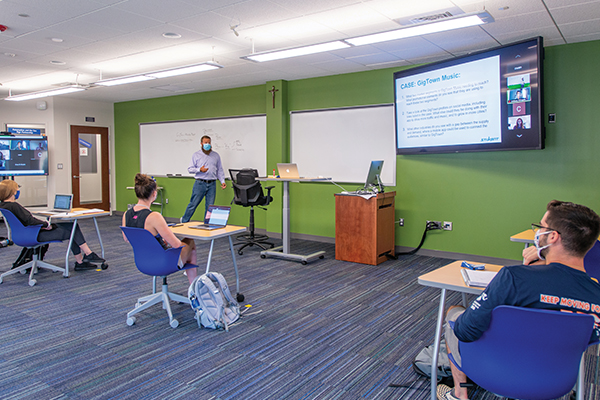
Success Through Flexibility
As part of the fall plan, Assumption announced it would implement a two-term semester, with students taking either two or three accelerated courses in each term. Students took a full 15-credit semester, with each course meeting daily for seven and a half weeks (synchronously, to accommodate those on campus and those learning remotely). Though more intense, this arrangement allowed students to focus more closely on fewer subjects at one time.
Assumption spent the summer advising and training faculty on modifying their courses to fit the new format. “There has been a high level of engagement, and the faculty have risen to this unprecedented challenge,” said Greg Weiner, Ph.D., provost and academic vice president. “They are adapting creatively to several layers of complication. All of our courses include hybrid learning that is accessible both to students on campus and students who are remote. Integrating remote students or faculty is more difficult in some classes, like labs, than others, but our faculty are finding innovative solutions.”
The two-term semester also permitted Assumption to welcome more student on campus. “We never anticipated bringing back all of our students in the fall, as the de-densification requirements for residence halls, classrooms, dining facilities, etc., made it impossible to do so,” President Cesareo explained. “This enables us to provide students who desire a residential experience with that experience.”
Sustaining Mission
Though there were many iterations of potential scenarios for the fall, President Cesareo said the key elements that guided the process were the ability to build in flexibility; the health and safety of the students and of the community itself; and ensuring that the institution could preserve the uniqueness of an Assumption education regardless of the modality of delivery, both in terms of the underlying philosophy of an Assumption education and the importance of establishing a community of learners, whereby students and faculty alike engage with one another in the process of learning.
“Those three things are very important in helping students to recognize the unique value of the kind of education that Assumption offers, which I think is highlighted in this particular moment in time,” he said. “In the midst of all these challenges, our education is an education grounded in ideas, an education grounded in enduring questions, and what we want our students to appreciate during this time is that their education is going to revolve around the critical questions that really get at the deepest desire of the human heart in terms of comprehending their responsibility for the common good, comprehending what constitutes prudential judgment, and also understanding the dignity of the human person and the importance of the preservation of life in the midst of a pandemic.”
No matter in which form students are learning this academic year, Assumption has ensured that the essence of the Catholic, liberal education is the same. “We didn’t want to be offering remote classes in terms of a transactional experience, but we wanted this to be a transformative experience in the same way as it happens when students are in the classroom physically, face-to-face with their peers and their professors, engaging, debating, and grappling with these fundamental questions.”

